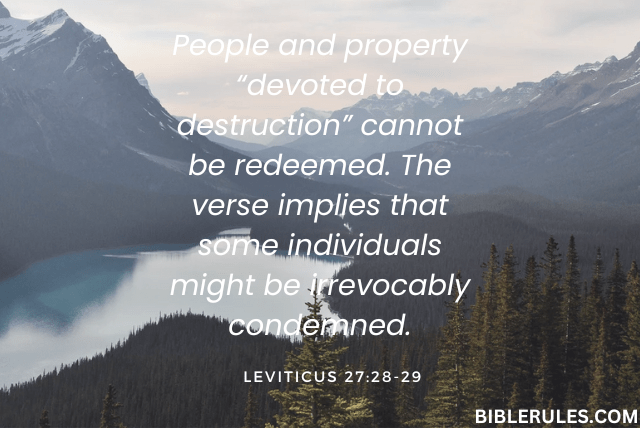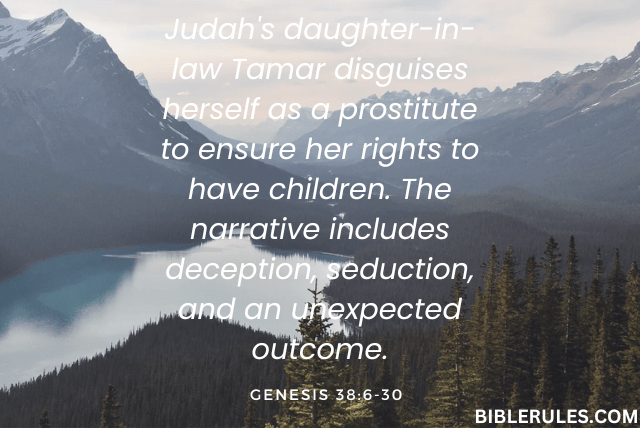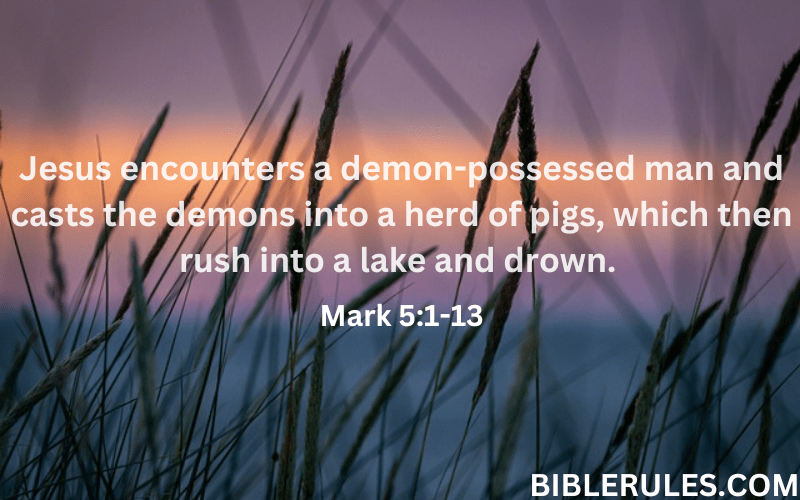The Bible is a book filled with timeless wisdom, truth, and divine messages of love, redemption, and hope. But among its sacred pages, you’ll find some unusual, even strange, verses that make you pause. These “weird Bible verses” often seem puzzling or bizarre at first glance. Yet, they carry profound lessons and invite readers to explore the deeper meaning and significance behind their mystical, sometimes cryptic, narratives. God’s Word, though filled with comfort, also challenges our modern sensibilities, offering unique perspectives that enrich faith and inspire deeper insights.
From strange passages about peculiar laws in the Old Testament to mystical encounters and cryptic prophecies, these thought-provoking scriptures provoke questions and spark debates. They highlight the diverse content of the Bible, reflecting its role as a block of Christian faith that has guided millions of believers over the years. Even the most controversial or head-scratching verses hold the potential to uncover wonderful truths, challenging us to embrace the mystery and uncover the meaning behind God’s ways.
Here are the list of 60 Most Weird Bible Verses
Weird Bible Verses in the Old Testament
1. Numbers 5:11-31
This passage details the ritual for determining if a wife has been unfaithful. A priest prepares “bitter water” to curse her if she is guilty, involving grain offerings and symbolic gestures. The description is elaborate and unsettling.
2. Leviticus 14:33-53
This section explains the ritual for purifying a house afflicted by mildew. The process includes inspecting the house, removing contaminated stones, and using a mix of blood, water, cedarwood, and hyssop to cleanse it.
3. Deuteronomy 28:15-68
Known as the “Curses for Disobedience,” this lengthy passage lists terrifying consequences for failing to obey God’s commandments, including famine, disease, and exile. The vivid imagery of cannibalism during sieges stands out.
4. Ezekiel 16:1-63
This allegorical passage compares Jerusalem to an unfaithful wife. It graphically describes her actions as spiritual adultery, detailing betrayal and divine punishment in shocking language.
5. Judges 19:22-30
A Levite’s concubine is brutally assaulted and killed. The Levite cuts her body into twelve pieces and sends them throughout Israel to incite outrage. The description is graphic and deeply disturbing.
6. Exodus 21:1-11
This passage outlines laws about Hebrew slaves. It describes rules for selling daughters as servants, their treatment, and conditions for freedom, offering a stark view of ancient customs.
7. Ezekiel 4:9-17
God instructs Ezekiel to bake bread over human dung as a sign of Israel’s defilement during exile. After Ezekiel protests, God allows him to use cow dung instead. The detailed instructions and symbolism make this verse memorable.
8. Leviticus 20:1-5
This law commands the death penalty for anyone who sacrifices their children to the god Molech. It vividly warns of God’s wrath against those who practice idolatry.
9. 1 Samuel 15:1-35
God commands Saul to utterly destroy the Amalekites, including men, women, children, infants, and animals. The passage describes Saul’s partial obedience and his punishment for sparing King Agag.

10. Ezekiel 23:1-49
This chapter uses graphic language to describe two sisters, Oholah and Oholibah, as symbols of Israel and Judah. Their “prostitution” represents idolatry and unfaithfulness, with detailed descriptions of their actions and punishments.
11. Genesis 19:1-29
The destruction of Sodom and Gomorrah includes Lot offering his daughters to protect his guests and the subsequent judgment of the cities. The narrative is both dramatic and troubling.
12. Deuteronomy 13:6-11
This passage commands the execution of anyone, even family members, who tries to entice others to worship false gods. The detailed instruction to stone them serves as a stark warning.
13. Leviticus 27:28-29
People and property “devoted to destruction” cannot be redeemed. The verse implies that some individuals might be irrevocably condemned.

14. Ezekiel 37:1-14
In the vision of the Valley of Dry Bones, Ezekiel witnesses a miraculous reassembly of skeletons into living beings. The imagery of bones coming together is vivid and eerie.
15. Exodus 32:19-35
After the Israelites worship the golden calf, Moses orders the Levites to kill about 3,000 people as punishment. The description of the violence is striking.
16. Genesis 6:1-4
The story of the Nephilim, mysterious beings born from the “sons of God” and human women, raises questions about divine beings interacting with humanity.
17. Genesis 38:6-30
Judah’s daughter-in-law Tamar disguises herself as a prostitute to ensure her rights to have children. The narrative includes deception, seduction, and an unexpected outcome.

18. Exodus 4:24-26
God seeks to kill Moses on his journey to Egypt, but Zipporah circumcises their son and touches Moses’ feet with the foreskin, appeasing God. The reason remains cryptic.
19. Numbers 22:21-35
Balaam’s donkey speaks to him after seeing an angel blocking their path. The dialogue between Balaam and the donkey is both strange and humorous.
20. Leviticus 11:20-23
The dietary laws allow eating certain insects, like locusts and grasshoppers, but forbid others, such as birds with four legs. The descriptions are peculiar.
21. Leviticus 18:6-23
A detailed list of prohibited sexual relations includes bizarre examples, such as lying with animals, accompanied by strong warnings of punishment.
22. Numbers 31:13-18
Moses commands his men to kill all Midianite males and non-virgin women after a battle, sparing only young virgin girls. The moral implications are unsettling.
23. Deuteronomy 22:28-29
If a man rapes an unbetrothed virgin, he must marry her and pay her father fifty shekels of silver. The law’s practicality is debated.
24. Judges 6:36-40
Gideon tests God by asking for signs using a fleece. First, the fleece is wet with dew while the ground is dry; then the opposite occurs.
25. Judges 7:1-8
God reduces Gideon’s army from 32,000 to 300 by having the soldiers drink water in a peculiar way. Those who lap like dogs are chosen.
26. Judges 14:5-9
Samson kills a lion and later finds honey in its carcass, eating it and giving some to his parents without telling them its source.
27. Judges 15:15-17
Samson uses the jawbone of a donkey to kill a thousand Philistines. The vivid description of the event is striking.
28. Judges 16:1-3
Samson visits a prostitute in Gaza, and when the Philistines try to capture him, he tears off the city gates and carries them to a hill.
29. Judges 18:14-31
The Danites steal idols and a priest from Micah’s household, then use the stolen items to set up their worship.
30. 1 Samuel 6:1-9
The Philistines return the Ark of the Covenant to Israel with offerings of golden tumors and rats to stop a plague, a peculiar form of atonement.
31. 1 Kings 13:11-25
A prophet is killed by a lion after being deceived into disobeying God. The lion stands by the body, refusing to eat it.
32. 2 Kings 2:23-25
Elisha curses a group of boys mocking him for being bald. Two bears come out of the woods and maul 42 of them.
33. 2 Kings 6:1-7
Elisha makes an iron axe head float in water after a man accidentally loses it in a river. The miracle is unusual but practical.
34. 2 Kings 13:20-21
A dead man is revived after his body touches Elisha’s bones. The account is both miraculous and mysterious.
35. Isaiah 20:1-4
God commands Isaiah to walk naked and barefoot for three years as a sign of judgment against Egypt and Cush.
Related: Why You MUST Stay Away from the Book of Enoch
36. Jeremiah 13:1-11
God tells Jeremiah to bury a linen belt and later retrieve it. The belt is ruined, symbolizing Judah’s spiritual corruption.
37. Jeremiah 19:1-13
God instructs Jeremiah to break a clay jar to symbolize the destruction of Jerusalem, with vivid descriptions of the consequences.
38. Ezekiel 1:1-28
Ezekiel’s vision of four-faced creatures, wheels within wheels, and a radiant figure on a throne is a vivid, mystical experience.
39. Ezekiel 8:7-18
Ezekiel is shown idol worship in the temple, including elders worshiping idols in secret and women mourning Tammuz.
40. Ezekiel 24:15-27
God tells Ezekiel that his wife will die and forbids him to mourn publicly, using this as a symbol of Jerusalem’s impending loss.
41. Daniel 2:31-45
Nebuchadnezzar’s dream of a statue with a gold head, silver chest, bronze thighs, iron legs, and clay feet is interpreted as a prophecy of kingdoms.
42. Daniel 4:13-33
Nebuchadnezzar dreams of a great tree and is later driven mad, living like an animal until he acknowledges God’s sovereignty.
43. Daniel 5:1-31
The mysterious handwriting on the wall during Belshazzar’s feast is interpreted as a prophecy of doom, fulfilled that very night.
44. Hosea 1:2-3
God commands Hosea to marry a prostitute as a symbol of Israel’s unfaithfulness, leading to a unique and challenging narrative.
45. Hosea 3:1-5
Hosea is told to reconcile with his unfaithful wife, demonstrating God’s enduring love for Israel despite their sins.
46. Joel 2:1-11
Joel describes an army of locusts in vivid, apocalyptic terms, comparing their invasion to the day of the Lord.
47. Amos 4:6-11
Amos recounts God’s punishments for Israel’s disobedience, including famine, drought, and plagues, each vividly described.
48. Jonah 2:1-10
Jonah’s prayer from the belly of the fish includes poetic imagery of sinking into the deep and being saved by God.
49. Micah 5:2-15
Micah prophesies the Messiah’s birth in Bethlehem and describes future judgment on idolaters with powerful imagery.
50. Habakkuk 1:2-17
Habakkuk questions God about the rise of the Babylonians, describing their cruelty and power in striking terms.
51. Zechariah 5:1-11
Zechariah sees a flying scroll and a woman in a basket, symbolizing curses and wickedness being removed from Israel.
52. Zechariah 6:1-8
The vision of four chariots emerging between mountains of bronze symbolizes God’s judgment and power.
53. Malachi 1:6-14
Malachi condemns the priests for offering blemished sacrifices, vividly describing their disrespect toward God.
54. Exodus 23:20-33
God promises to send an angel to lead the Israelites but warns them to obey His commands or face consequences.
55. Leviticus 25:1-7
The land is commanded to rest every seventh year, with detailed instructions on how the Israelites should live during this Sabbath year.
56. Numbers 16:1-35
The rebellion of Korah ends with the earth swallowing him, his followers, and their families, described dramatically.
57. Deuteronomy 21:18-21
The law allows parents to bring a rebellious son to the elders, where he could be stoned for his disobedience.
58. Joshua 10:12-15
Joshua commands the sun and moon to stand still during a battle, described as one of God’s miraculous interventions.

59. Judges 3:15-25
Ehud, a left-handed judge, assassinates King Eglon by stabbing him so deeply that the blade disappears into his body.
60. 2 Samuel 6:6-7
Uzzah touches the Ark of the Covenant to steady it and is struck dead by God for his irreverence.
Weird Bible Verses in the New Testament
1. Matthew 5:29-30
“If your right eye causes you to stumble, gouge it out and throw it away. It is better for you to lose one part of your body than for your whole body to be thrown into hell.”
2. Matthew 21:18-19
Early in the morning, Jesus curses a fig tree for not bearing fruit, even though it was not the season for figs, and the tree immediately withers.
3. Mark 5:1-13
Jesus encounters a demon-possessed man and casts the demons into a herd of pigs, which then rush into a lake and drown.

4. Mark 8:23-25
Jesus spits on a blind man’s eyes and lays hands on him twice before his vision is fully restored.
5. Luke 14:26
“If anyone comes to me and does not hate father and mother, wife and children, brothers and sisters—yes, even their own life—such a person cannot be my disciple.”
6. John 6:53-56
Jesus tells his followers they must eat his flesh and drink his blood to have eternal life, a teaching that confuses and offends many.
7. Acts 5:1-11
Ananias and Sapphira are struck dead after lying about the proceeds of a sale they claimed to have donated in full to the apostles.
8. Acts 19:11-12
Paul’s handkerchiefs and aprons are used to heal the sick and drive out demons, showcasing an unusual form of miraculous power.
9. 1 Corinthians 11:10
Paul says that a woman should have a symbol of authority on her head because of the angels, a cryptic statement with debated meaning.
10. 1 Corinthians 15:29
“Now if there is no resurrection, what will those do who are baptized for the dead? If the dead are not raised at all, why are people baptized for them?”
11. 2 Corinthians 12:2-4
Paul describes being caught up to the “third heaven” and hearing inexpressible things that no one is permitted to tell.
12. Galatians 5:12
Paul, frustrated with false teachers, sarcastically suggests they should go the whole way and emasculate themselves.
13. Revelation 6:12-14
The opening of the sixth seal causes a great earthquake, the sun turns black, the moon becomes like blood, and the stars fall to the earth.
14. Revelation 9:7-10
John describes locusts with human faces, crowns of gold, hair like women’s hair, teeth like lions, and tails that sting like scorpions.
15. Revelation 12:1-6
A woman clothed with the sun, standing on the moon, and crowned with twelve stars gives birth while a dragon waits to devour her child.
Shocking Bible Verses About Morality
1. Leviticus 20:9
“Anyone who curses their father or mother is to be put to death. Because they have cursed their father or mother, their blood will be on their own head.”
2. Deuteronomy 21:18-21
“If someone has a stubborn and rebellious son who does not obey his father and mother… Then all the men of his town are to stone him to death.”
3. Exodus 22:18
“Do not allow a sorceress to live.”
This verse outlines a harsh penalty for witchcraft in ancient Israelite society.
4. Numbers 31:17-18
“Now kill all the boys. And kill every woman who has slept with a man, but save for yourselves every girl who has never slept with a man.”
5. Judges 19:24-25
“Look, here is my virgin daughter and his concubine. I will bring them out to you now, and you can use them and do to them whatever you wish. But as for this man, don’t do such an outrageous thing.”
6. Hosea 1:2
“When the Lord began to speak through Hosea, the Lord said to him, ‘Go, marry a promiscuous woman and have children with her, for like an adulterous wife this land is guilty of unfaithfulness to the Lord.'”
7. Matthew 5:27-28
“You have heard that it was said, ‘You shall not commit adultery.’ But I tell you that anyone who looks at a woman lustfully has already committed adultery with her in his heart.”
8. 1 Corinthians 6:9-10
“Do you not know that wrongdoers will not inherit the kingdom of God? Do not be deceived: Neither the sexually immoral nor idolaters nor adulterers nor men who have sex with men… will inherit the kingdom of God.”
9. Ephesians 5:5
“For of this you can be sure: No immoral, impure, or greedy person—such a person is an idolater—has any inheritance in the kingdom of Christ and of God.”
10. Revelation 21:8
“But the cowardly, the unbelieving, the vile, the murderers, the sexually immoral, those who practice magic arts, the idolaters, and all liars—they will be consigned to the fiery lake of burning sulfur.”
8 Bizarre Bible Verses That Challenge Beliefs
1. Genesis 6:4
“The Nephilim were on the earth in those days—and also afterward—when the sons of God went to the daughters of humans and had children by them. They were the heroes of old, men of renown.”
This mysterious verse about the Nephilim raises questions about divine beings, human interbreeding, and ancient mythology.
2. Exodus 4:24-26
“At a lodging place on the way, the Lord met Moses and was about to kill him. But Zipporah took a flint knife, cut off her son’s foreskin, and touched Moses’ feet with it. ‘Surely you are a bridegroom of blood to me,’ she said. So the Lord let him alone.”
This odd encounter suggests a connection between circumcision, divine wrath, and Moses’ mission.
3. Leviticus 11:20-23
“All flying insects that walk on all fours are to be regarded as unclean by you. There are, however, some flying insects that walk on all fours that you may eat: those that have jointed legs for hopping on the ground.”
The dietary laws on insects challenge modern biological classifications and customs.
4. 2 Kings 2:23-24
“From there Elisha went up to Bethel. As he was walking along the road, some boys came out of the town and jeered at him. ‘Get out of here, baldy!’ they said. ‘Get out of here, baldy!’ He turned around, looked at them, and called down a curse on them in the name of the Lord. Then two bears came out of the woods and mauled forty-two of the boys.”
This severe response to mockery challenges our understanding of divine justice.
5. Ezekiel 4:12-13
“Eat the food as you would a loaf of barley bread; bake it in the sight of the people, using human excrement for fuel.”
Ezekiel’s prophetic act symbolizes Israel’s coming defilement, though it is a shocking and bizarre command.
6. Matthew 8:32
“He said to them, ‘Go!’ So they came out and went into the pigs, and the whole herd rushed down the steep bank into the lake and died in the water.”
The story of demons entering pigs and their subsequent mass suicide raises theological questions about spirits and animals.
7. Mark 14:51-52
“A young man, wearing nothing but a linen garment, was following Jesus. When they seized him, he fled naked, leaving his garment behind.”
This brief and unusual detail in the Gospels leaves readers wondering about its purpose and significance.
8. Revelation 9:7-10
“The locusts looked like horses prepared for battle. On their heads they wore something like crowns of gold, and their faces resembled human faces. Their hair was like women’s hair, and their teeth were like lions’ teeth.”
This vivid and bizarre imagery challenges believers to interpret apocalyptic visions.

